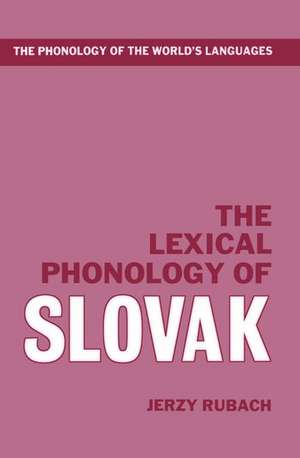The Lexical Phonology of Slovak: The Phonology of the World's Languages
Autor Jerzy Rubachen Limba Engleză Hardback – 29 iul 1993
Din seria The Phonology of the World's Languages
- 26%
 Preț: 542.02 lei
Preț: 542.02 lei - 34%
 Preț: 1082.22 lei
Preț: 1082.22 lei - 27%
 Preț: 334.57 lei
Preț: 334.57 lei - 22%
 Preț: 317.91 lei
Preț: 317.91 lei - 24%
 Preț: 377.51 lei
Preț: 377.51 lei - 18%
 Preț: 355.85 lei
Preț: 355.85 lei - 30%
 Preț: 973.56 lei
Preț: 973.56 lei - 8%
 Preț: 352.07 lei
Preț: 352.07 lei - 34%
 Preț: 1156.63 lei
Preț: 1156.63 lei -
 Preț: 357.36 lei
Preț: 357.36 lei - 18%
 Preț: 322.91 lei
Preț: 322.91 lei - 14%
 Preț: 396.66 lei
Preț: 396.66 lei - 34%
 Preț: 791.50 lei
Preț: 791.50 lei - 34%
 Preț: 1113.49 lei
Preț: 1113.49 lei - 34%
 Preț: 746.24 lei
Preț: 746.24 lei - 30%
 Preț: 819.56 lei
Preț: 819.56 lei - 30%
 Preț: 790.44 lei
Preț: 790.44 lei - 26%
 Preț: 820.73 lei
Preț: 820.73 lei - 9%
 Preț: 307.53 lei
Preț: 307.53 lei - 30%
 Preț: 699.76 lei
Preț: 699.76 lei - 30%
 Preț: 629.46 lei
Preț: 629.46 lei
Preț: 501.20 lei
Preț vechi: 754.79 lei
-34% Nou
Puncte Express: 752
Preț estimativ în valută:
95.93€ • 104.24$ • 80.64£
95.93€ • 104.24$ • 80.64£
Carte tipărită la comandă
Livrare economică 09-15 aprilie
Preluare comenzi: 021 569.72.76
Specificații
ISBN-13: 9780198240006
ISBN-10: 0198240007
Pagini: 328
Ilustrații: line drawings throughout
Dimensiuni: 162 x 242 x 25 mm
Greutate: 0.64 kg
Ediția:New.
Editura: Clarendon Press
Colecția Clarendon Press
Seria The Phonology of the World's Languages
Locul publicării:Oxford, United Kingdom
ISBN-10: 0198240007
Pagini: 328
Ilustrații: line drawings throughout
Dimensiuni: 162 x 242 x 25 mm
Greutate: 0.64 kg
Ediția:New.
Editura: Clarendon Press
Colecția Clarendon Press
Seria The Phonology of the World's Languages
Locul publicării:Oxford, United Kingdom
Recenzii
the first full-scale, generative treatment of the Slovac sound system...Many of Rubach's analyses are ingenious; most are convincing...Rubach's monograph offers the phonologist an insightful view of a challenging body of data. For the Slavist it should provide motivation to take another look at Slovak.
Rubach has made his assumptions crystal clear, presents fully explicit analyses of an enormous body of data and provides his fellow phonologists with exactly the material they need to do whatever they will with it. It is monographs of this sort which prove to have lasting value, and Rubach's book makes a most propitious start to what promises to be a very useful series.
The book displays considerable scholarship and attention to detail and is written in Rubach's characteristically clear and unfussy style...
Rubach has made his assumptions crystal clear, presents fully explicit analyses of an enormous body of data and provides his fellow phonologists with exactly the material they need to do whatever they will with it. It is monographs of this sort which prove to have lasting value, and Rubach's book makes a most propitious start to what promises to be a very useful series.
The book displays considerable scholarship and attention to detail and is written in Rubach's characteristically clear and unfussy style...







